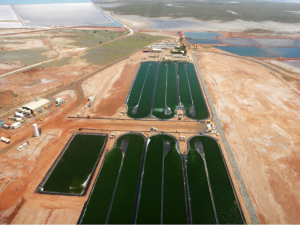Agenda Showcases Breakthrough Algae Commercialization, Research and Supporting Industries
Orlando, FL (July 8, 2013) The Algae Biomass Organization (ABO), the trade association for the algae industry, announced today that the preliminary agenda for the 7th Annual Algae Biomass Summit has been finalized, unveiling a list of algae experts and leaders that will be discussing the latest advances in algae commercialization, research and finance at the industry’s largest conference. The agenda for the Summit, being held September 30-October 3rd in Orlando, Florida can be viewed at: www.algaebiomasssummit.org.
Among the agenda highlights are updates on the full range of algae-derived products, from fuels to feeds and specialty chemicals. An opening panel on the latest developments in algae-derived biofuels will include Paul Woods, Chief Executive Officer of Florida-based Algenol Biofuels and CJ Warner, Chief Executive Officer and Chairman of Sapphire Energy. A second opening panel featuring companies commercializing high-value algae-based feeds, nutritional products and specialty chemicals includes Tim Burns, President of BioProcess Algae; Dan Simon, President of Heliae and Mike VanDrunen, Chief Executive Officer and Founder of Algix, LLC.
ABO chose Orlando for the location of the Summit given the presence of some of the industry’s most promising companies in the region. The Southwest has also recently been shown to have ample land and saltwater resources required to support a robust algae industry.
“Algae is attracting more attention than ever because we are seeing, for the first time, new production facilities come on line and a growing array of algae-derived products, including biofuels, being offered to consumers,” said Mary Rosenthal, executive director of ABO. “Our meeting in Orlando will highlight the tremendous progress that algae entrepreneurs, researchers and investors have made around the globe. We expect announcements about new breakthroughs and deals in everything from algae fuel, fertilizers, feeds, and even services like wastewater treatment and CO2 emission remediation.”
The Summit comes at a time when the industry is seeing more algae companies successfully move their laboratory breakthroughs into the marketplace. Many companies are opening large-scale demonstration and pre-commercial facilities, with expectations for expansion in the future. State and national policy makers are also taking notice. Arizona, Ohio and Iowa have all recently passed legislation to attract algae companies, and this past January Congress passed the first-ever algae biofuel tax credit.
The Algae Biomass Organization produces the Algae Biomass Summit annually. The 2012 Algae Biomass Summit, held in Denver, Colorado, was attended by almost 800 stakeholders across the industry from more than 20 countries.
More information about the Summit can be found at www.algaebiomasssummit.org.
Products made from algae are the natural solution to the energy, food, economic, and climate challenges facing the world today. Algae have the power to simultaneously put fuels in vehicles, recycle CO2, provide nutrition for animals and people and create jobs for millions of Americans. More information can be found at www.allaboutalgae.com.
About the Algae Biomass Organization
The Algae Biomass Organization (ABO) is a 501(c)(6) non-profit whose mission is to promote the development of viable commercial markets for renewable and sustainable commodities derived from algae. Its membership is comprised of people, companies and organizations across the value chain. More information about ABO, including its leadership, membership, costs, benefits and members and their affiliations, is available at the website:www.algaebiomass.org.

